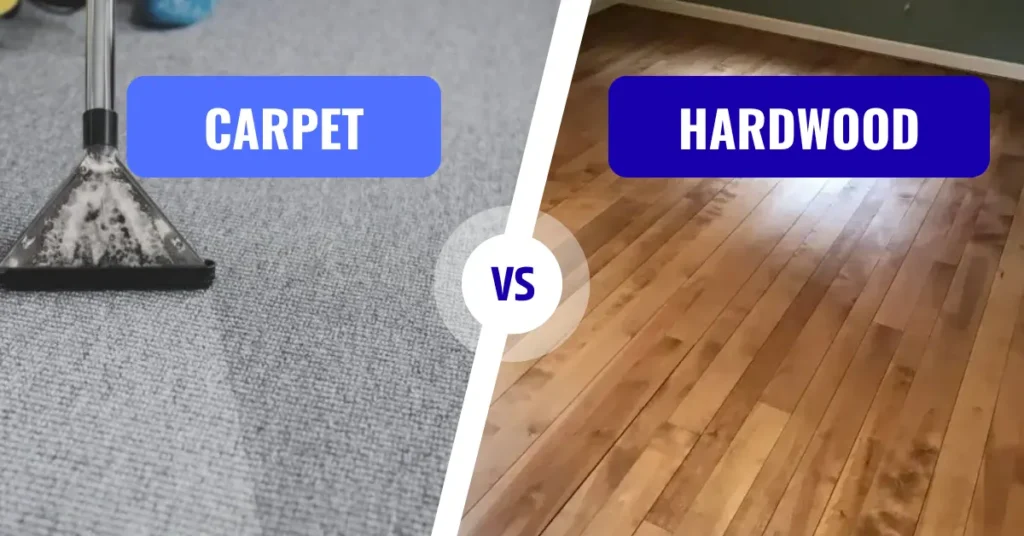Table of Contents
Carpet Vs. Hardwood Flooring: which is the right choice for your home? It’s a decision that not only impacts the aesthetics of your space but also affects comfort, maintenance, and even your home’s value. Deciding between Carpet Vs. Hardwood Flooring can be challenging because it depends on what matters most to you: durability, comfort, lifespan, or ROI. To help you make a confident decision, we’ve highlighted some of the most important factors you should consider before choosing.
Which Flooring Should You Choose? Side-by-Side Comparison
When discussing flooring options, the choice between Carpet Vs. Hardwood Flooring often arises as a central topic.
The comparison of Carpet Vs. Hardwood Flooring involves various aspects, including cost, durability, and aesthetics.
| Decision Factor | Carpet | Hardwood Flooring |
|---|---|---|
| Cost Comparison | Costs $3–$7 on average. Less expensive upfront. | Costs $6–$12 on average. Higher upfront cost. |
| Important Price Note | Prices vary based on material & quality tiers. | Prices vary based on material & quality tiers. |
| Durability – Overall | Not as durable as hardwood, but durability can improve with care. | Much more durable; made from solid or engineered wood. |
| Durability – Foot Traffic | High-traffic areas cause wear, loss of softness, fading, and reduced lifespan. Not recommended. | Handles heavy foot traffic very well. Recommended for high-traffic areas. |
| Durability – Sun Damage | Carpet fades easily in sunlight; not UV-resistant. | Hardwood is more resistant but can lighten or darken over time depending on wood species. |
| Durability – Stains / Scratches | Stains are a major issue; require cleaning or stain-resistant materials (Dyed Nylon, Triexta). | Susceptible to scratches and dents from pets & furniture, but can be refinished. |
| Durability – Moisture | Less affected by moisture than hardwood, but mold may form if wet for long periods. | Moisture causes shrinking, cracking, cupping, and uneven corners. |
| Lifespan | 4–14 years, depending on material & quality. | 25–90+ years. |
| Maintenance Requirements | Weekly vacuuming + professional cleaning every 2 years. | Sweep & dust mop regularly; professional service if color dulls or dents appear. |
| Maintenance Difficulty | Easier day-to-day but harder to deep-clean (stains, odor absorption). | Easy daily cleaning; dents/scratches may need professional refinishing. |
| Comfort | Soft, warm, cozy, sound-absorbing, comfortable for kids & seniors. | Harder, naturally cold, louder footsteps. |
| Aesthetics | Cozy, textured, and warm. | Modern, elegant, timeless, makes rooms look larger. |
| Installation Time | 1–2 days for an average room. Small rooms can be DIY. | Takes several days to weeks. Requires professional tools & skill. |
| Resale Value / ROI | Lower ROI due to short lifespan (4–14 years). | Higher ROI; lasts decades and preferred by home buyers. |
| Long-Term Costs | Needs regular professional cleaning (every 12–18 months). | Refinishing required every 7–10 years. |
Hardwood vs. Carpet: Cost Comparison
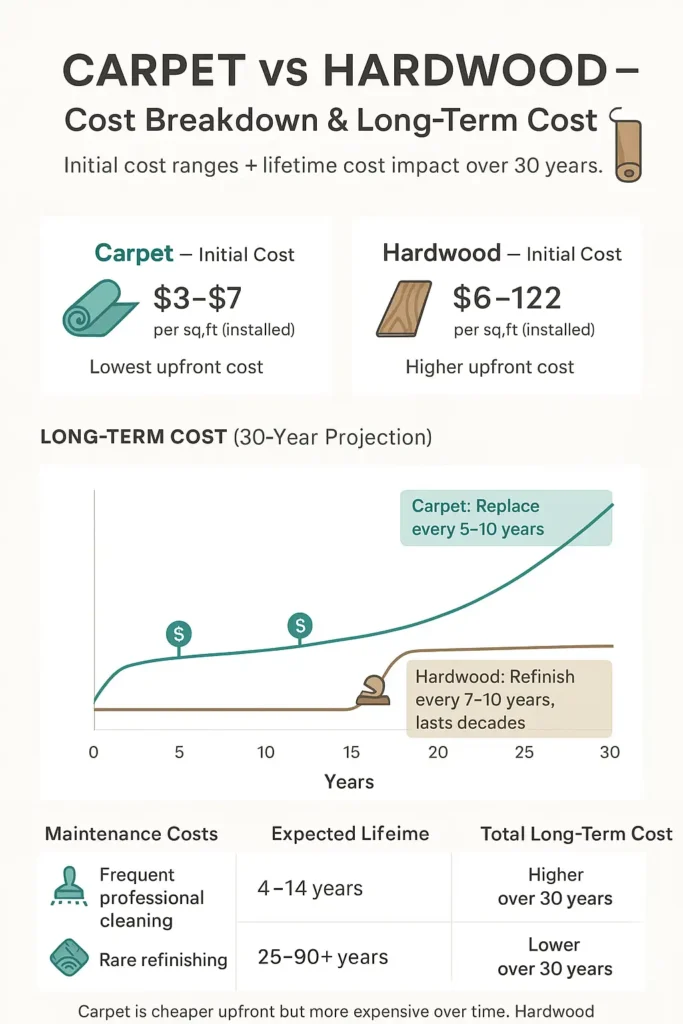
When weighing the pros and cons of Carpet Vs. Hardwood Flooring, it’s essential to consider your unique lifestyle and preferences.
In many households, the debate of Carpet Vs. Hardwood Flooring is ongoing, with both options having their devoted supporters.
Initial Cost Considerations
Ultimately, your choice between Carpet Vs. Hardwood Flooring will contribute to your home’s overall functionality and comfort.
Generally, carpet is the more budget-friendly option, with prices ranging from $3 to $7 per square foot. This includes both materials and installation. Hardwood flooring, on the other hand, tends to be pricier, often running between $6 to $12 per square foot.
High-end options like exotic wood varieties can exceed these estimates. Deciding between carpet and hardwood flooring isn’t solely about initial expenses. Hardwood flooring is renowned for lasting decades with proper care and can increase the resale value of your home.
Deciding between carpet and hardwood flooring isn’t solely about initial expenses. Hardwood flooring is renowned for lasting decades with proper care. This flooring option can increase the resale value of your home. In contrast, carpet typically shows signs of wear and tear within about 5 to 10 years, depending on quality and maintenance. While carpet can offer comfort and warmth, it may need to be replaced more frequently than hardwood.
As you assess the merits of Carpet Vs. Hardwood Flooring, consider how each option aligns with your home’s design.
Carpet Vs. Hardwood Flooring also invites questions about maintenance and long-term value.
Maintenance and Associated Costs
Carpet requires frequent vacuuming and professional cleaning to prevent allergens and extend its life span. For those in humid or spill-prone areas, hardwood flooring may require sealing every few years to protect against water damage and scratches. Although hardwood cleaners and polishes may seem like additional costs, they are usually less frequent and can be budgeted annually.
Durability and Lifespan
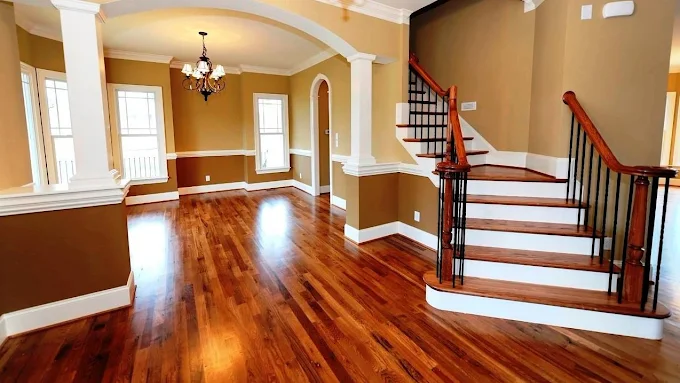
Hardwood flooring is well-known for its robustness. With proper maintenance, it can last for decades, making it a long-term investment. Many homeowners in historic districts appreciate the charm and durability of hardwood flooring that has been maintained over 50 years.
To extend its life, consider using area rugs in areas that see frequent foot traffic to protect underlying carpet and vacuum frequently to schedule professional cleanings.
Carpet, while offering comfort, typically has a shorter lifespan. Depending on usage and quality, it may need replacing every 5-10 years, particularly in high-traffic areas.
Carpet, while offering comfort, typically has a shorter lifespan. Depending on usage and quality, it may need replacing every 5-10 years, particularly in high-traffic areas. To extend its life, consider:
- Use area rugs: Place them in areas that see frequent foot traffic to protect underlying carpet.
- Regular cleaning: Vacuum frequently and schedule professional cleanings.
Case Study: High-Traffic Home
Recently, we had too refinishing a floor of a bustling family home in Manchester CT. What amazed us was that hardwood revealed its strength over decades with minimal refinishing, while carpet required replacement within a decade due to stains and wear.
If durability is a priority, hardwood flooring offers a long lifespan, while carpet may demand frequent attention and care.
Aesthetic and Style
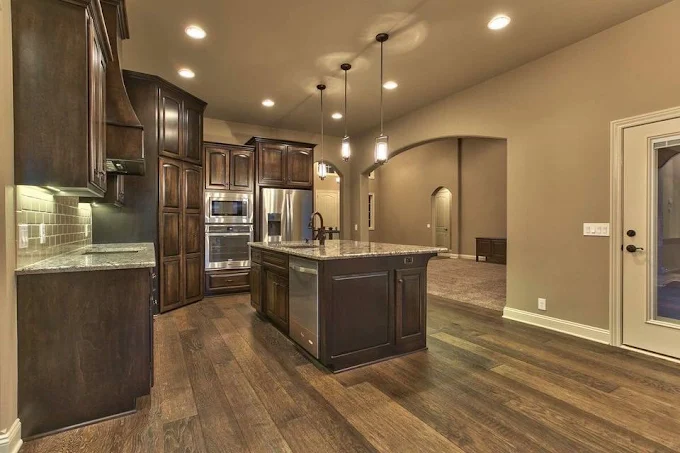
Carpet are available in a myriad of colors, textures, and patterns. It’s particularly popular in bedrooms and family areas where comfort is a priority. In environments where soundproofing is essential, such as home theaters, carpet is advantageous due to its sound absorption properties. For families with young children, carpet creates a safe, cushioned surface for play.
In contrast to carpet, hardwood flooring provides a different aesthetic and sophistication. Its ability to blend into various design styles makes it a favorite among homeowners looking for a refined look. Moreover, hardwood floors are prized for their ability to make spaces appear larger and more open.
Comfort and Insulation
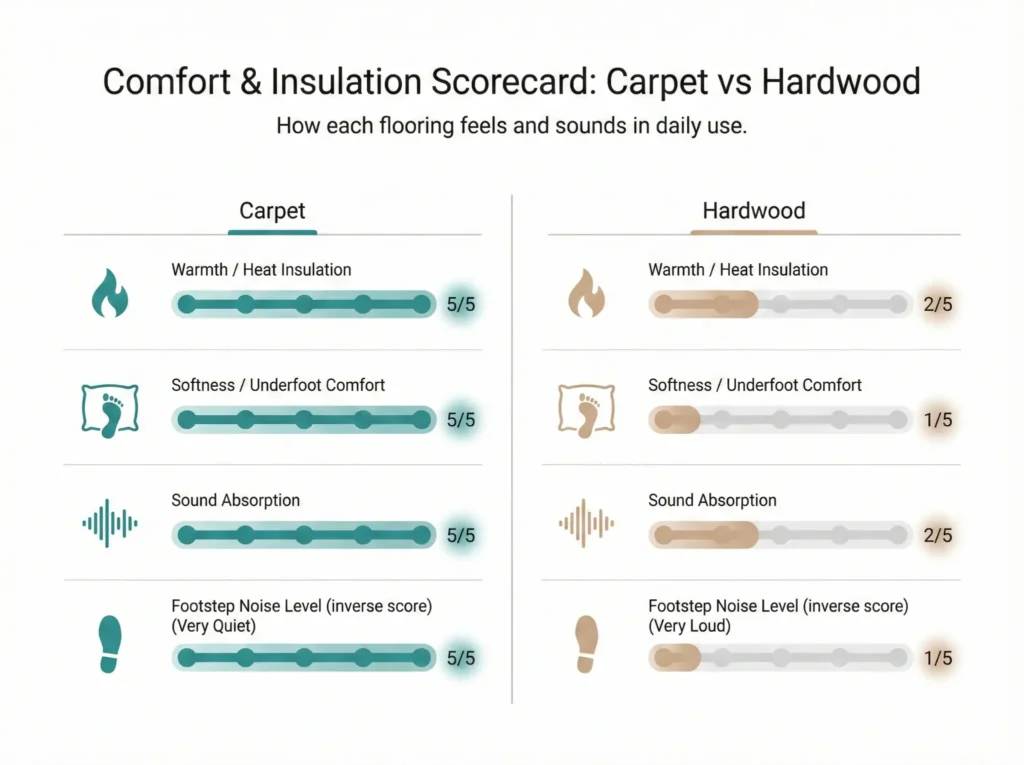
When evaluating carpet versus hardwood flooring, considering comfort and insulation is crucial. Each option offers unique benefits, influencing your home’s overall warmth and ambiance.
Carpet is synonymous with comfort, providing a soft underfoot feel that makes it popular in bedrooms and living areas. Its plush texture makes it ideal for homes in colder climates, acting as an additional heat insulator.
Carpet has excellent sound and heat insulation properties, reducing noise transfer between floors and maintaining a cozy indoor temperature. This makes it perfect for multi-story homes or urban apartments where noise control is vital. Hardwood, though lacking in the warmth of carpet, can still provide decent acoustic control, especially when paired with rugs or underlays. It retains heat better than tiles, balancing elegance and insulation efficiently.
Health and Allergy Considerations
When considering the pros and cons of adding carpet versus hardwood flooring to your home, health and allergy considerations are paramount. The choice of flooring impacts not only your immediate health and well-being but also long-term maintenance requirements.
Allergen Concerns with Carpet
Carpets are often a topic of discussion when it comes to allergens, as their fibers can trap dust, pollen, and pet dander more readily than hardwood flooring. Here’s how you can minimize allergen concerns if you choose carpet:
- Regular Vacuuming: Use a vacuum cleaner with a HEPA filter to reduce dust particles and allergens.
- Frequent Steam Cleaning: Opt for professional steam cleaning at least twice a year to further eliminate allergens embedded deep in the carpet fibers.
- Low Pile Carpets: Consider installing low pile carpets, which are easier to clean and harbor fewer allergens compared to plush, high-pile options.
Health Benefits of Hardwood Flooring
For allergy sufferers, hardwood flooring can be a healthier option. Here’s why hardwood might be the better choice if reducing allergens is your priority:
- Ease of Cleaning: Hardwood surfaces allow for easy sweeping and mopping, preventing the accumulation of allergens.
- Fewer VOCs: High-quality finishes for hardwood often emit fewer volatile organic compounds (VOCs) compared to some carpets, contributing to better indoor air quality.
Considerations for Mold and Mildew
In summary, the discussion of Carpet Vs. Hardwood Flooring encompasses a range of factors to consider.
Moisture can lead to mold and mildew issues in both carpet and hardwood flooring, but it affects them differently:
- Carpet Susceptibility: Carpets in humid environments or well-trafficked areas like basements are prone to mold if not dry-cleaned regularly.
- Hardwood Solutions: Hardwood naturally repels allergens better but requires consistent sealing to prevent moisture penetration.
If you live in a damp climate, opting for moisture-resistant underlays for carpet, or ensuring the hardwood is properly sealed, can mitigate these risks significantly.
When weighing carpet against hardwood flooring for health and allergy considerations, it’s essential to evaluate your specific health needs and geographical location. Each choice comes with its own set of health implications that must be managed with regular maintenance and preventive measures.
Maintenance and Cleaning
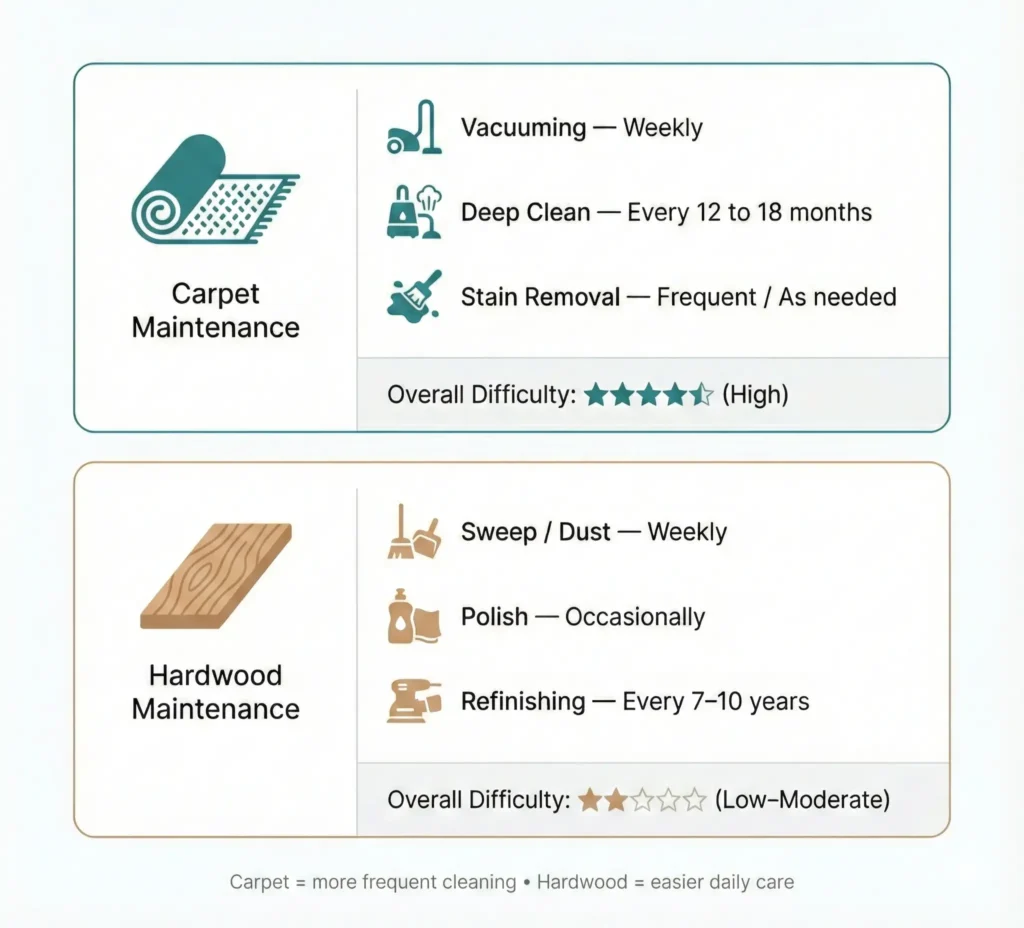
When choosing between carpet and hardwood flooring, understanding the maintenance and cleaning requirements is pivotal. This decision not only affects your ongoing household chores but also impacts the longevity and appearance of your floors. Let’s explore how maintaining each type of flooring can fit into your lifestyle.
Whether you’ve chosen carpet or hardwood flooring, occasional mishaps are inevitable. Here’s how to address some common challenges:
- Dealing with Carpet Odors: Sprinkling baking soda before vacuuming can absorb unpleasant smells, a quick fix embraced by many busy households.
- Handling Hardwood Scratches: Minor scratches on hardwood can be disguised using a repair kit or applying a stain-matching marker. For deep scratches, consider sanding and refinishing the affected area.
Ultimately, understanding the maintenance and cleaning nuances is key. Thoughtful care can enhance the longevity of your choice, preserving its beauty and functionality over time.
Water and Heat Resistance
Water Resistance
When considering carpet vs. hardwood flooring, water resistance is a key factor. Hardwood flooring naturally repels moderate moisture but can warp or discolor with prolonged exposure. Therefore, in spill-prone areas like kitchens, seal hardwood periodically to protect against spills.
Conversely, carpeting absorbs moisture quickly, which may lead to mold and mildew. Utilize moisture-resistant underlays in damp areas to combat this. Regular steam cleaning can help prevent mold in carpeted spaces.
Heat Resistance
When you think about Carpet Vs. Hardwood Flooring, remember the importance of lifestyle compatibility.
Understanding the nuances of Carpet Vs. Hardwood Flooring can help you make an informed decision.
In the context of your overall home design, Carpet Vs. Hardwood Flooring plays a significant role.
Choosing between Carpet Vs. Hardwood Flooring is a decision that can greatly influence your home’s atmosphere.
In terms of heat resistance, hardwood flooring is advantageous due to its ability to withstand temperature fluctuations without damage. This makes it suitable for rooms with fireplaces or radiant floor heating systems. A classic example includes renovations in older homes where hardwood endures temperature changes.
Carpet can, however, melt if exposed to direct heat, but it provides excellent insulation. Choose flame-retardant materials to mitigate risks in vulnerable areas.
In conclusion, consider specific water and heat resistance needs when choosing between carpet and hardwood flooring for lasting results.
Resale Value
When considering how flooring impacts your home’s value, both carpet and hardwood play distinct roles in resale value. Understanding these can guide your choice.
Impact of Flooring Choice on Home Resale Value
Hardwood flooring often enhances resale value due to its classic appeal and longevity. In many real estate markets, homes with hardwood floors sell faster and at higher prices. For instance, a survey by the National Association of Realtors indicates that 54% of buyers are willing to pay more for homes with hardwood floors. Conversely, carpet might not significantly boost resale value, particularly in high-value neighborhoods where hardwood or similarly durable materials are expected.
Finding the Perfect Balance
Deciding between carpet and hardwood flooring isn’t just about choosing one over the other; it’s about finding a balance that suits your personal style and functional needs. Both flooring options offer unique benefits in terms of aesthetic appeal. For those torn between the two, mixing different floorings strategically throughout the home can provide the best of both worlds. Consider using carpet in bedrooms for a cozy touch and hardwood in common areas for durability and a more formal look. This tactical approach not only contributes to the overall aesthetic but also ensures your flooring meets the practical demands of each space. Ultimately, whether you prioritize the plush comfort of carpet or the timeless beauty of hardwood, your choice can significantly influence the feel and personality of your home. As you decide, keep in mind the style, function, and personal preference that best fits into your home’s design vision.
Conclusion
In conclusion, choosing between carpet and hardwood flooring is a significant decision that impacts not only the look and feel of your home but also its long-term value and functionality. We’ve explored how hardwood flooring, despite its initial higher cost, offers exceptional durability and a timeless elegance that can increase your home’s resale value. Meanwhile, carpet provides warmth, comfort, and a budget-friendly option, making it ideal for creating cozy, sound-insulating spaces.
Both flooring options require diligent maintenance. Carpet needs frequent vacuuming and professional cleanings, while hardwood benefits from regular sweeping and occasional resealing to maintain its beauty. Each choice carries its unique set of health and sustainability considerations.
As you evaluate your options, remember that Carpet Vs. Hardwood Flooring can affect your home’s resale value.
For expert help with your Carpet Vs. Hardwood Flooring decision, contact us today!
Now that you’re informed about the key aspects of carpet vs. hardwood flooring, you’re well-equipped to make the best choice for your home. Consider factors such as lifestyle, budget, and future plans to guide your decision-making process. Begin by evaluating the specific needs of each room , perhaps opting for a hybrid approach that uses both types according to the function and style of your space.
Ready to start your flooring transformation? Contact us for hardwood floor installation. We offer installation and refinishing services throughout Connecticut, USA.
Frequently Asked Questions
What are the cost differences between carpet and hardwood flooring?
Carpet offers a budget-friendly option with costs ranging from $3 to $7 per square foot, including installation. Hardwood is pricier, generally between $6 to $12 per square foot, with high-end types exceeding these costs. While hardwood’s initial expense is higher, its longevity and potential increase in home resale value often make it a wiser investment. Consider both immediate and long-term costs, factoring in installation, maintenance, and future value in your budget.
How does the durability of carpet compare to hardwood flooring?
Hardwood flooring is celebrated for its robustness, potentially lasting decades with proper care. In comparison, carpet, although comfortable, may show signs of wear within 5 to 10 years, especially in high-traffic areas. For carpet longevity, use area rugs and conduct regular vacuuming. If durability and lifespan are priorities, hardwood is a superior choice, contributing to lower replacement costs over time.
Which is easier to maintain: carpet or hardwood flooring?
Carpet requires frequent vacuuming and occasional professional cleaning to remain allergen-free and maintain appearance. Hardwood demands regular sweeping or dusting and periodic sealing to protect against water damage and scratches. While hardwood’s annual maintenance may appear costly, it is generally more manageable than the frequent cleanings carpet necessitates, making it easier for many homeowners.
As you evaluate your options, remember that Carpet Vs. Hardwood Flooring can affect your home’s resale value.
For expert help with your Carpet Vs. Hardwood Flooring decision, contact us today!

